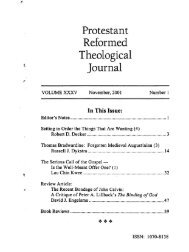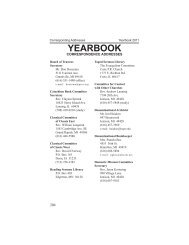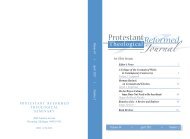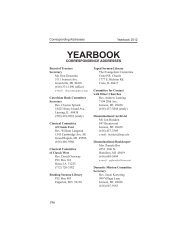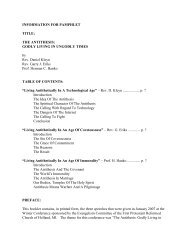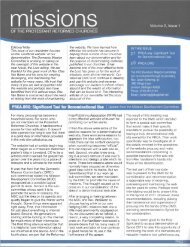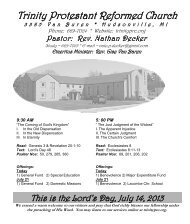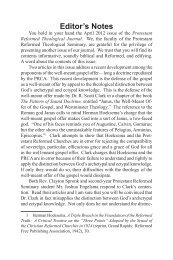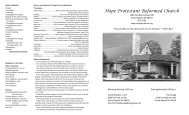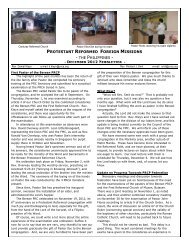November 2007 - Protestant Reformed Churches in America
November 2007 - Protestant Reformed Churches in America
November 2007 - Protestant Reformed Churches in America
Create successful ePaper yourself
Turn your PDF publications into a flip-book with our unique Google optimized e-Paper software.
Preparatory Grace <strong>in</strong> the Puritans<br />
generation. Perk<strong>in</strong>s’ massive work, The Cases of Conscience, was<br />
published posthumously <strong>in</strong> 1606. In a chapter entitled “What Must<br />
a Man Do That He May Come Into God’s Favor And Be Saved”<br />
Perk<strong>in</strong>s writes that God usually guides the s<strong>in</strong>ner through several<br />
stages before regeneration takes place:<br />
God gives man the outward means of salvation, especially the m<strong>in</strong>istry<br />
of the word, and with it he sends some outward or <strong>in</strong>ward cross to<br />
break and subdue the stubbornness of our nature that it may be made<br />
pliable to the will of God … this done, God br<strong>in</strong>gs a man to a consideration<br />
of the Law … he makes a man particularly to see and know<br />
his own peculiar and proper s<strong>in</strong>s whereby he offends God … he smites<br />
the heart with a legal fear … he makes him to fear punishment and<br />
hell and to despair of salvation <strong>in</strong> regard of anyth<strong>in</strong>g <strong>in</strong> himself. 2<br />
Perk<strong>in</strong>s therefore taught that, before regeneration, the stubbornness<br />
of the s<strong>in</strong>ner’s nature is subdued, his will is made pliable<br />
to God’s will, and the dead s<strong>in</strong>ner is made to see and experience<br />
the extent of his depravity. He then comes under a legal fear<br />
so that he despairs of salvation. However, <strong>in</strong>sisted Perk<strong>in</strong>s, these<br />
actions upon the s<strong>in</strong>ner’s nature, emotions, and will are not necessarily<br />
fruits of regeneration, for, he adds “these four actions are<br />
<strong>in</strong>deed no fruits of grace, for a reprobate may go thus far.” They<br />
are only “works of preparations go<strong>in</strong>g before grace.” 3<br />
Perk<strong>in</strong>s did not teach that these preparatory steps are carried<br />
out by man, but by God, or with God’s assistance. Perk<strong>in</strong>s was<br />
prevented by his decretal theology from “flirt<strong>in</strong>g with any concept<br />
of meritorious preparation for conversion on the part of<br />
man.” 4 Man could not produce these good th<strong>in</strong>gs <strong>in</strong> himself, but<br />
their outcome did depend <strong>in</strong> part on man. If both the elect and the<br />
2. William Perk<strong>in</strong>s, The Whole Treatise of the Cases of Conscience,<br />
Book I, Chapter V, pp. 50-51; spell<strong>in</strong>g of orig<strong>in</strong>al modernized, italics<br />
added.<br />
3. Perk<strong>in</strong>s, Whole Treatise, Book I, Chapter V, p. 51, italics added.<br />
4. Young Jae Timothy Song, Theology and Piety <strong>in</strong> the <strong>Reformed</strong><br />
Thought of William Perk<strong>in</strong>s and John Preston (The Edw<strong>in</strong> Mellen Press:<br />
Lewiston, NY, 1998), p. 132.<br />
<strong>November</strong> <strong>2007</strong> 59



